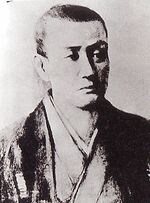Difference between revisions of "Kiyokawa Hachiro"
m (needs cleanup) |
m (→References: removed draft status) |
||
| (One intermediate revision by the same user not shown) | |||
| Line 8: | Line 8: | ||
==The life of Kiyokawa Hachirô== | ==The life of Kiyokawa Hachirô== | ||
| − | Kiyokawa Hachirô was born in Kiyokawa village in [[Shonai han]] as a son of a [[Goshi|Gôshi]]. Disinterested in his family's ''Sake'' brewing business, he travelled to Edo where he studied under Tojo Ichido and Azumi Ryosai, and he also received a [[Menkyo]] of [[Hokushin Itto Ryu]] at [[Genbukan]]. | + | Kiyokawa Hachirô was born in Kiyokawa village in [[Shonai han]] as a son of a [[Goshi|Gôshi]] (rural Samurai). Disinterested in his family's ''Sake'' brewing business, he travelled to Edo where he studied under Tojo Ichido and Azumi Ryosai, and he also received a [[Menkyo]] of [[Hokushin Itto Ryu]] at [[Genbukan]]. |
| − | |||
| − | + | In [[1855]] he opened the Kiyokawa school. It was the only school in Edo that offered both study and Kenjutsu. He was a confucian scholar, and an ardent opponent of the Tokugawa bakufu, and he used his school as a platform for his views. | |
| − | |||
| − | + | While in Edo, he killed a man in the street because of a perceived slight, and was forced to leave Edo or face arrest. From March to September 1855, he traveled to many places in [[Honshu]] and wrote the book "Saiyu so". | |
| − | + | After the [[Incident at Sakuradamon]], the Kiyokawa school became a meeting place for the [[Sonjo Roshi]], and they formed the "[[Torao party]]" which assassinated [[Henry Heusken]]. | |
| + | |||
| + | In [[1862]], Kiyokawa submitted the "Three emergency measures" to [[Matsudaira Shungaku]]. Matsudaira took this plan and created the [[Roshigumi]]. | ||
| + | |||
| + | In February, [[1864]] in Mibu, Kyoto, Kiyokawa suddenly changed the purpose of the Roshigumi and made all but 19 people return to Edo. Those who decided to remain Kyoto included [[Kondo Isami]], [[Hijikata Toshizo]], [[Serizawa Kamo]] who later founded the [[Shinsengumi]]. | ||
In April, Kiyokawa was assassinated by Bakufu assassins( including [[Sasaki Tadasaburo|Sasaki Tadasaburô]]) in Azabu. | In April, Kiyokawa was assassinated by Bakufu assassins( including [[Sasaki Tadasaburo|Sasaki Tadasaburô]]) in Azabu. | ||
| − | The Rôshigumi was renamed | + | The Rôshigumi was renamed the [[Shinchogumi]], and worked under [[Shonai han]] as special police force in Edo. |
==Kiyokawa Hachiro in Fiction== | ==Kiyokawa Hachiro in Fiction== | ||
| Line 46: | Line 48: | ||
[[Category:Bakumatsu]] | [[Category:Bakumatsu]] | ||
[[Category:Edo Period]] | [[Category:Edo Period]] | ||
| − | |||
| − | |||
Latest revision as of 17:44, 2 December 2015
- Born: 1830
- Died: 1863
- Titles: Exective of Roshigumi
- Childhood Name: Motoji
- Japanese: 清河八郎 (Kiyokawa hachiro)
The life of Kiyokawa Hachirô
Kiyokawa Hachirô was born in Kiyokawa village in Shonai han as a son of a Gôshi (rural Samurai). Disinterested in his family's Sake brewing business, he travelled to Edo where he studied under Tojo Ichido and Azumi Ryosai, and he also received a Menkyo of Hokushin Itto Ryu at Genbukan.
In 1855 he opened the Kiyokawa school. It was the only school in Edo that offered both study and Kenjutsu. He was a confucian scholar, and an ardent opponent of the Tokugawa bakufu, and he used his school as a platform for his views.
While in Edo, he killed a man in the street because of a perceived slight, and was forced to leave Edo or face arrest. From March to September 1855, he traveled to many places in Honshu and wrote the book "Saiyu so".
After the Incident at Sakuradamon, the Kiyokawa school became a meeting place for the Sonjo Roshi, and they formed the "Torao party" which assassinated Henry Heusken.
In 1862, Kiyokawa submitted the "Three emergency measures" to Matsudaira Shungaku. Matsudaira took this plan and created the Roshigumi.
In February, 1864 in Mibu, Kyoto, Kiyokawa suddenly changed the purpose of the Roshigumi and made all but 19 people return to Edo. Those who decided to remain Kyoto included Kondo Isami, Hijikata Toshizo, Serizawa Kamo who later founded the Shinsengumi.
In April, Kiyokawa was assassinated by Bakufu assassins( including Sasaki Tadasaburô) in Azabu.
The Rôshigumi was renamed the Shinchogumi, and worked under Shonai han as special police force in Edo.
Kiyokawa Hachiro in Fiction
Books
- Kiyokawa Hachiro (清河八郎) Shibata Renzaburo
- Kimyonari Hachiro (奇妙なり八郎) Shiba Ryotaro
- Bakumatsu Shippuroku (幕末疾風録) Ito Hitoshi
- Kaiten no mon (回天の門) Fujisawa Shuhei
Movies
- Ansatsu (暗殺) Shinoda Masahiro (1964), based in Shiba Ryotaro's story
Research books
- Kiyokawa Hachiro no Meiji Ishin (清河八郎の明治維新) Takano Kiyoshi
Kiyokawa's book
- Saiyu so (西遊草) Purchase link on Amazon.co.jp
References
- Hillsborough, Romulus. Shinsengumi: The Shogun's Last Samurai Corps, Tuttle Publishing, 2005
- Shinsengumi Taishi Den (新選組隊士伝) Gakken
- J-wikipedia Kiyokawa Hachiro
